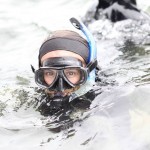
Assistant Professor of Biology, Associate Director of BU Marine Program
Twitter: @DaviesswPhD and @thedavieslab
Courses Taught
Current Research
Changing climates and ongoing anthropogenic habitat modifications threaten natural ecosystems worldwide. In response to these threats, a species has four choices: i) remain in the natal habitat but suffer reduced fitness, ii) acclimate to current conditions by modifying their physiologies, iii) adapt to the local environment through natural selection on standing genetic variation, or iv) disperse to new, more favorable environments. Research in my lab studies the potential roles of acclimation, adaptation, and dispersal in an organism’s response to rapid climate change.
Understanding how symbioses are maintained is fundamental as climate change disrupts symbiotic relationships worldwide. The coral–Symbiodinium symbiosis is essential and serves as the cornerstone for the entire reef ecosystem. Both symbiotic partners exhibit physiological stress responses when exposed to climate-associated stressors; however, Symbiodinium have been implicated as the ‘weak link’ in dysbiosis. Conversely, several lines of evidence suggest that only the host’s transcriptome exhibits a stress response, suggesting that coral hosts might actively control the symbiont’s environment and eventually facilitate dysbiosis. One major avenue of research in my lab addresses how coral hosts regulate their symbiont’s environment.
Range shifts in corals have been observed in response to ongoing global warming. In collaboration with scientists from Japan, we are using genomics and a series of physiological experiments to characterize range expansion populations of both coral hosts and their algal symbionts to better understand how these populations persist along a range front.
Selected Publications
- Wright RM, Correa AMS, Quigley LA, Davies SW (2019) Gene expression of endangered coral (Orbicella spp.) in the Flower Garden Banks National Marine Sanctuary after Hurricane Harvey. In press at Frontiers in Marine Science: special issue Gulf of Mexico Reefs: Past, Present and Future: 484872.
- Ali A, Laake L, Kriefall NG, Kenkel CD, Matz MV, Davies SW (2019) Recruit symbiosis establishment and Symbiodiniaceae composition influenced by adult corals and reef sediment. Coral Reefs 38 (3): 405-415.
- Davies SW, Ries, JB, Marchetti A, Castillo KD (2018) Symbiodinium functional diversity in the coral Siderastrea siderea is influenced by thermal stress and reef environment, but not ocean acidification. Frontiers in Marine Science 5: 150.
- Rippe JP, Matz MV, Green EA, Medina M, Khawaja NZ, Pongwarin T, Pinzon C JH, Castillo KD, Davies SW (2017) Population structure of the mountainous stay coral Orbicella faveolata throughout the Caribbean and Gulf of Mexico basin. Ecology and Evolution 7 (22): 9234-9246.
- Davies SW, Marchetti A, Ries, JB, Castillo KD (2016) Thermal and pCO2 stress elicit divergent transcriptomic responses in a resilient coral. Frontiers in Marine Science FMARS-02-00062.
- Dixon G, Davies SW, Aglyamova GA, Meyer E, Bay LK, Matz MV (2015) Genomic determinants of coral heat tolerance across latitudes. Science 348:6242 1460-1462.
- Davies SW, Treml E, Kenkel CD, Matz MV (2015) Exploring the role of Micronesian islands in the maintenance of coral genetic diversity in the Pacific Ocean. Molecular Ecology 24: 70-82.
- Davies SW, Wham D, Kanke M, Matz MV (in revision) Contrasting population genetic structure in Acropora coral hosts and their algal symbionts across multiple spatial scales. In revision at Molecular Ecology: MEC-19-0262.